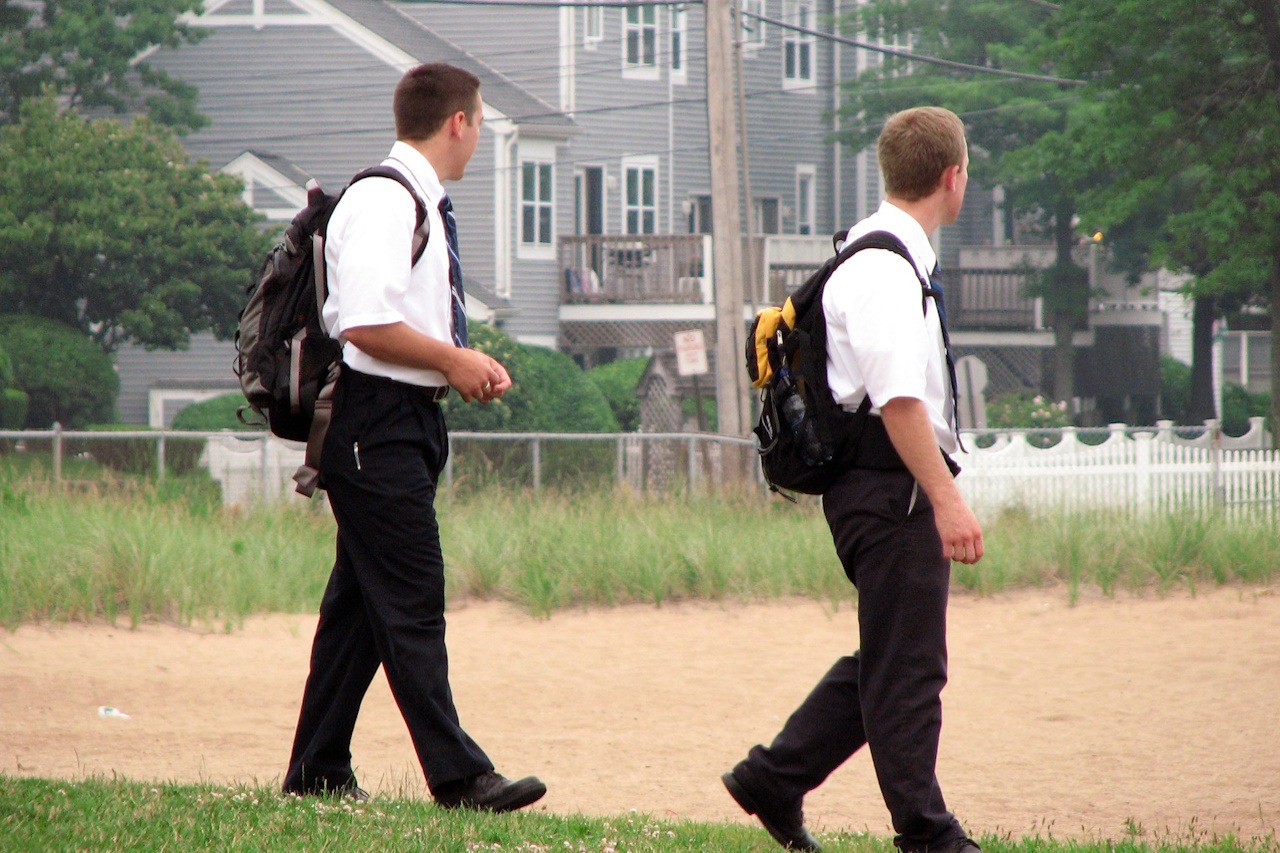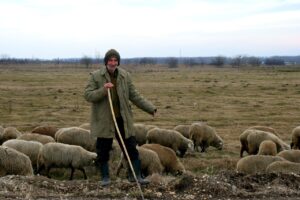Exodus 19: 1-6a (RM in Canada) or 2-6a (RM in the U.S.) or 2-8a (RCL); Psalm 100; Romans 5: 6-11 (RM) or 1-8 (RCL); Matthew 9: 36—10:8 (RM) or 9: 35-10:8 (RCL).
A Jewish liturgy scholar of my acquaintance tells a funny story.
He lives in New York City, and at one time he seemed to be listed on every door-to-door, Bible-believing, evangelist’s list of potential converts. One day he responded to the Bible-thumper at the door thus:
“Your Jesus, he was a Jew, right?
The man responded, “Yes he was a Jew.”
“He was a good Jew, right?”
“Yes, he was a good Jew.”
“He lived and died as a Jew, right?”
“Yes, he lived and died as a Jew.”
“Well, if it’s good enough for Jesus, it’s good enough for me!”
And he hasn’t been bothered since.
Our Gospel reading for today lends itself much too easily, I think, to exhortations to go out and make more believers, and that was probably the exact message of many homilies and sermons in the past. One-on-one recruiters for anything, really, can be boring and eventually annoying. You just know that he or she doesn’t really care about you personally. You’re just another soul to be saved from eternal damnation, another member to be enrolled, another click on the success tabulation sheet.
So what do we do with a passage that moves from compassion for helpless people as sheep without shepherds, to a change in metaphor urging prayer for labourers to harvest them, followed by a list of names, twelve men to be precise, sent out with instructions as to how to save them? As always, we start with what the writer of Matthew was trying to convey to his first-century Jewish-Christian community in their own context.
Notice that the author has Jesus telling them to avoid the neighbouring Samaritans, as well as all Gentiles – as if these people are not equally lost? As if they don’t matter? Liturgy professor Stephen Wilbricht writes,
“For Matthew’s audience, primarily a community of Jewish Christians struggling to understand their faith in a rapidly changing society where they are no longer accepted by the Jewish community, and in the wake of the Temple’s destruction, this command by Jesus to minister within given boundaries would have been reassuring.”
Most readers of this Reflection know that the twelve Apostles (and this is the only place in Matthew’s Gospel where they are called by this name, which means “those sent out”) deliberately parallels the twelve tribes of Israel. Jewish Christians would not only see the analogy but internalize it. And most know that the whole image of “harvest” and “labourers” is an implied reference, not to recruiting new believers in the here and now, but as a warning about the age to come, the end-of-times, the eschatological age. At the end of time, the wicked would be culled out from among the righteous and, well, you don’t want to dwell too long on their fate. The apostles were being sent to cast out “unclean spirits,” evidence that God’s presence was taking hold in the world and driving out the reign of evil. Matthew’s people undoubtedly knew what they were hearing.
What are we hearing? Let’s tug on a thread from the First Reading, the line
“You shall be for me a priestly kingdom and a holy nation.”
Aspiring to holiness is nothing we can accomplish on our own, any more than we can “cure the sick, raise the dead, cleanse the lepers, [and] cast out demons” just by our own willpower. Works do not make faith, it’s the other way around. The apostles are sent bearing the gift of faith that was given to them, and anything they do, any good they can accomplish, is a manifestation of that faith.
A priestly people does not need to perform gee-whiz-wow miracles to give insight, hope, and in a sense, new life to those who need it most. A holy people, by healing wounds and pushing to eradicate any form of injustice, lets holiness radiate outward.
© Susan K. Roll
Photo Credit: “Mormon Missionaries” Image © versageek, 2008, via Flickr. Some Rights Reserved.
License: Creative Commons – Attribution-ShareAlike 2.0 Generic (CC BY-SA 2.0)
Used in accordance with the license and copyright law.
Susan Roll retired from the Faculty of Theology at Saint Paul University, Ottawa, in 2018, where she served as Director of the Sophia Research Centre. Her research and publications are centred in the fields of liturgy, sacraments, and feminist theology. She holds a Ph.D. from the Catholic University of Leuven (Louvain), Belgium, and has been involved with international academic societies in liturgy and theology, as well as university chaplaincy, Indigenous ministry and church reform projects.





Hi friends, thanks for being here! We have a new feature: you can now subscribe to be notified of comments on blog articles. The subscribe feature is located just above the comment window. Here’s how to subscribe:
1. Go to “Subscribe” and click on the down arrow to the right.
2. Choose “Notify of new follow-up comments” to receive email notifications of all new comments to this page. Or, choose “Notify of new replies to my comments” to receive notifications of replies to your own comments only.
3. Enter your email address and click the yellow arrow button.
4. Go to your email and find the confirmation letter from RNDM Canada. The email should appear immediately, but if doesn’t, please check your spam folder. If the email is in spam, confirm that RNDM Canada is not spam. Then open the email, and click “confirm subscription”.
5. You’re now all set to receive email notifications! =)
Please note: This does not subscribe you to all comments on all articles on the blog, just comments on this particular blog article. If you want to be notified of comments on other articles, you will need to subscribe to each article separately. You are also free to unsubscribe any time you like, either here on the page, or within any email you receive from RNDM Canada.
Please feel free to reply to me here if you have any further questions or something is not clear. I’m always happy to help.